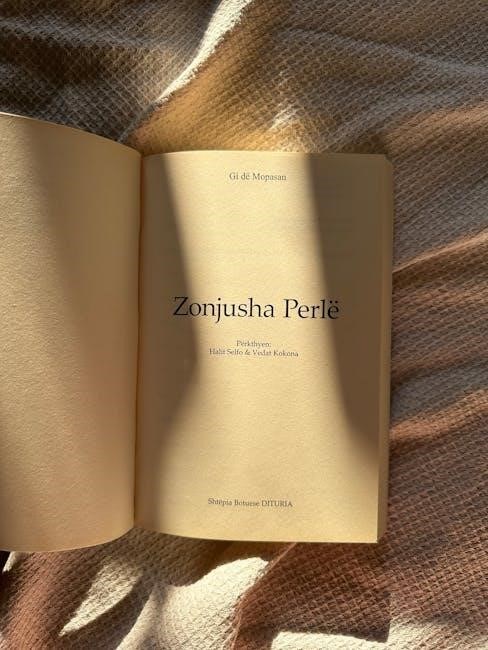Robert Fitzgerald’s 1961 translation of The Odyssey is celebrated for its poetic elegance and faithfulness to Homer’s original text, making it a timeless masterpiece.
Overview of Homer’s The Odyssey
The Odyssey, an ancient Greek epic poem attributed to Homer, recounts the journey of Odysseus as he navigates a decade-long quest to return home after the Trojan War. Comprising 24 books, the poem explores themes of heroism, perseverance, and the human condition. It delves into Odysseus’s encounters with mythical creatures and divine interventions, showcasing his cunning and resilience. The epic has become a cornerstone of world literature, celebrated for its rich storytelling and timeless universal themes. Its enduring appeal lies in its exploration of human nature and the complexities of life.
Significance of Robert Fitzgerald’s Translation
Robert Fitzgerald’s translation of The Odyssey is widely regarded as a landmark achievement in literary translation. First published in 1961, it has become the standard for modern interpretations of Homer’s epic poem. Fitzgerald’s work is praised for its poetic elegance, faithfulness to the original Greek, and accessibility to contemporary readers. His translation has sold over two million copies, making it a beloved resource for scholars, students, and literature enthusiasts. It remains a testament to the enduring appeal of The Odyssey and its universal themes.

Robert Fitzgerald as a Translator
Robert Fitzgerald was a renowned poet and translator, best known for his lyrical and faithful renditions of classical works like The Odyssey.
Fitzgerald’s Background and Literary Contributions
Robert Fitzgerald was a distinguished poet and translator, born in 1910. His work as a translator of classical texts, particularly The Odyssey, earned him the Bollingen Award in 1961. Fitzgerald’s translations are known for their poetic precision and ability to capture the essence of the original Greek. His contributions to literature include not only translations but also original poetry, making him a significant figure in modern literary circles. His version of The Odyssey remains widely studied and admired.
His Approach to Translating The Odyssey
Robert Fitzgerald’s translation of The Odyssey is renowned for its poetic elegance and readability. He balanced fidelity to Homer’s original text with a modern, lyrical style, using free verse and iambic pentameter to capture the epic’s rhythm. Fitzgerald’s approach emphasized clarity and emotional resonance, ensuring the ancient tale remained accessible while preserving its grandeur. His careful attention to detail and poetic sensibility transformed The Odyssey into a masterpiece of modern literature, bridging the gap between antiquity and contemporary readers.
The Use of Poetry and Style in the Translation
Fitzgerald’s translation masterfully employs poetry and style to convey Homer’s epic grandeur. Using free verse and iambic pentameter, he maintains the original’s rhythmic essence while adapting it to modern English. His lyrical prose ensures readability without sacrificing depth, blending poetic imagery with narrative flow. This approach preserves the emotional and cultural richness of The Odyssey, making it both a scholarly achievement and a literary delight for readers worldwide.

Historical Context of the Translation
Robert Fitzgerald’s translation of The Odyssey was published in 1961, a period of renewed interest in classical literature. It became a cornerstone of modern scholarship and education.
Publication and Reception in 1961
Robert Fitzgerald’s translation of The Odyssey was first published in 1961 to widespread acclaim. It quickly became a standard text for scholars and students, praised for its poetic accuracy and readability. The translation won the Bollingen Award, solidifying its reputation as a masterful rendition of Homer’s epic. Its publication marked a resurgence of interest in classical literature, making it accessible to modern audiences while preserving the original’s poetic essence. The work’s enduring popularity has led to its widespread use in educational settings and its availability in digital formats, including PDF, ensuring its continued relevance.
Impact on Modern Understanding of The Odyssey
Robert Fitzgerald’s translation has profoundly influenced modern perceptions of The Odyssey, offering a balanced blend of poetic beauty and scholarly accuracy. His work introduced Homer’s epic to a broader audience, making ancient Greek literature more accessible. The translation’s lyrical prose and clear structure have helped contemporary readers connect with the timeless themes of Odysseus’s journey. Its availability in PDF format has further expanded its reach, ensuring that Fitzgerald’s interpretation remains a cornerstone of both academic and casual exploration of the classic tale.

Key Features of the Fitzgerald Translation
Fitzgerald’s translation balances fidelity to Homer’s original text with a poetic, accessible style, preserving the epic’s grandeur while making it engaging for modern readers worldwide.
Fidelity to the Original Text
Robert Fitzgerald’s translation of The Odyssey remains remarkably faithful to Homer’s original Greek text, capturing the poetic essence and narrative richness of the epic poem. Fitzgerald meticulously preserved the structural integrity and thematic depth, ensuring that the translation stays true to the source material’s intent and spirit. His commitment to accuracy is evident in his careful rendering of Homer’s language, maintaining the balance between literal meaning and poetic expression. This fidelity has made his version a trusted resource for scholars and enthusiasts alike, bridging the gap between ancient and modern audiences effectively.
Accessibility and Readability for Modern Audiences
Robert Fitzgerald’s translation excels in making Homer’s ancient epic accessible to modern readers. His poetic prose maintains the original’s depth while offering a fluid, contemporary readability. Fitzgerald’s use of clear, evocative language ensures that the complexities of the original Greek text are approachable without sacrificing artistic integrity. This balance has made the translation a favorite among scholars, students, and general readers, ensuring that The Odyssey remains a vibrant, engaging work for generations. Its widespread use in academia and popular circles underscores its enduring appeal and readability.

Comparisons with Other Translations
Robert Fitzgerald’s translation stands out for its poetic mastery, balancing fidelity and artistry. Unlike Lattimore’s literalism or Fagles’ modern flair, Fitzgerald’s version remains a timeless, elegant interpretation.
Contrasts with Translations by Lattimore and Fagles
Robert Fitzgerald’s translation differs notably from those by Lattimore and Fagles. While Lattimore’s version is praised for its literal accuracy, it often feels more formal and less fluid. Fagles, conversely, opts for a modern, dynamic style that sacrifices some of Homer’s poetic structure. Fitzgerald, however, masterfully blends fidelity to the original with poetic elegance, creating a version that feels both authentic and approachable. His use of blank verse and lyrical prose sets his translation apart, making it a favorite among scholars and readers alike for its balance of artistry and faithfulness to Homer’s vision.
Why Fitzgerald’s Version Remains Popular
Robert Fitzgerald’s translation of The Odyssey endures due to its masterful blend of poetic elegance and fidelity to Homer’s original text. His use of blank verse captures the epic’s grandeur while maintaining readability. Fitzgerald’s prose resonates emotionally, making ancient themes feel timeless and relatable. Additionally, its availability in PDF format ensures accessibility for modern readers, further cementing its place as a beloved and enduring interpretation of Homer’s masterpiece.

The Odyssey in PDF Format
Robert Fitzgerald’s translation of The Odyssey is widely available in PDF format, offering readers convenient access to this beloved classic. Digital copies ensure timeless accessibility for modern audiences.
Availability of the Fitzgerald Translation as a PDF
Robert Fitzgerald’s translation of The Odyssey is widely available in PDF format, enabling easy access for readers worldwide. Published by Farrar, Straus, and Giroux in 1998, the digital version maintains the poetic essence of the original work. This format allows readers to engage with Odysseus’s epic journey on various devices, ensuring the classic remains accessible to modern audiences. The PDF version is particularly popular among students and scholars for its readability and convenience, making it a preferred choice for academic and personal use.
Challenges and Considerations for Digital Copies
The digital distribution of Robert Fitzgerald’s The Odyssey in PDF format presents challenges, including copyright restrictions and the need for publishers to restore access. Ensuring the poetic style and formatting are preserved in digital versions is crucial. Additionally, the rise of e-books has led to concerns about maintaining the translation’s integrity while adapting to various reading platforms. These considerations highlight the balance between accessibility and fidelity in the digital age for Fitzgerald’s revered translation.

Themes and Key Episodes in the Translation
Fitzgerald’s translation masterfully preserves Homer’s themes of perseverance, cunning, and fate, vividly capturing iconic episodes like Odysseus’s encounters with the Sirens and Scylla and Charybdis.
Major Themes Preserved in Fitzgerald’s Work
Fitzgerald’s translation masterfully retains Homer’s core themes, such as perseverance, cunning, and fate, while emphasizing the human struggle between free will and divine intervention. His poetic language enhances the exploration of loyalty, identity, and the complexities of heroism, ensuring these timeless motifs resonate with modern readers. The translation’s fidelity to Homer’s intent allows these themes to shine, making Fitzgerald’s work a bridge between ancient wisdom and contemporary understanding.
Iconic Episodes and Their Rendering in the Translation
Fitzgerald’s translation vividly captures the epic’s most iconic episodes, such as Odysseus’s encounter with the Sirens, the Cyclops, and the whirlpool Charybdis. His poetic language preserves the dramatic tension and emotional depth of these scenes, rendering them accessible to modern readers while staying true to Homer’s original intent. The rendering of Odysseus’s cunning and resilience in these episodes highlights Fitzgerald’s skill in balancing fidelity to the source with creative expression, ensuring the timeless appeal of these legendary moments.
Fitzgerald’s translation is a masterful blend of poetic artistry and fidelity, ensuring The Odyssey’s timeless appeal. Its availability in PDF has made it accessible to millions.
Legacy of Fitzgerald’s Translation
Robert Fitzgerald’s translation of The Odyssey has left an indelible mark on literary history. Since its publication in 1961, it has become a cornerstone of classical scholarship, praised for its poetic grace and fidelity to Homer’s original text. Fitzgerald’s work not only introduced The Odyssey to new generations but also set a benchmark for modern translations. His ability to balance artistic expression with scholarly accuracy earned him the Bollingen Award in 1961, solidifying his legacy as one of the most influential translators of the 20th century.
Relevance of The Odyssey in Modern Times
The Odyssey remains a timeless tale, resonating with modern audiences through its universal themes of resilience, cunning, and the human quest for home. Fitzgerald’s translation bridges ancient and contemporary cultures, making Homer’s epic accessible to new generations. Its exploration of leadership, identity, and morality continues to inspire, proving the enduring relevance of Odysseus’s journey. The availability of Fitzgerald’s translation in PDF format ensures its reach in the digital age, allowing readers to engage with this masterpiece effortlessly.